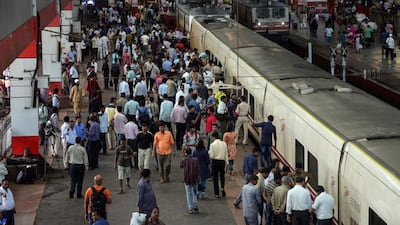‘Do you really intend to go to vote tomorrow?” The question was asked by my apprehensive nurse Shanta. “You have a small wound on your foot and an infection,” she added with nervousness. “We will decide tomorrow,” I told her to calm matters.
The Mumbai municipal elections were scheduled for last week. Now this governing body is responsible for the civic maintenance of Mumbai city. With a Dh20 billion budget, it is the richest municipality in India.
When Shanta counselled me that I should refrain from travelling to a polling booth the next day due to an infection and fever, I spent a sleepless night. Until then, I had steadfastly voted in every local and national election since the independence of India.
I reflected that the city has many problems and able leadership is vital to resolve issues. The city has witnessed a decline in the quality of lifestyle over a long period. Its population has grown significantly, from about 3 million in 1955 to 20 million in 2016. This has put immense pressure on the transport infrastructure.
Mumbai’s principal mode of transport is the train system comprising more than 2,300 train services extending over 450 kilometres. It transports millions of passengers every day. However, the coaches are antiquated and the doors do not even close when the train is in motion, leading to accidents.
Mumbai has an aggregate road length of about 2,000km. But the roads are cracked with potholes. They are repaired, but fresh potholes develop due to shoddy workmanship.
A car journey that takes 20 minutes on a Sunday can take up to two hours on a working day due to the traffic congestion. I dread to think how an ambulance would negotiate through the traffic snarls in an emergency.
The result of explosive population growth and the deteriorating infrastructure is that the city is gradually becoming unliveable.
I also contemplated how important it is to vote. In a large city or country, however rich or poor I may be, however old or young I may be, however socially powerful or frail I may be, it is important that I express my opinion and my will.
Over the years polling has become more efficient. In the 1950s and 1960s, we were given a list of all the candidates with their symbols. We had to stamp the name of the candidate we were voting for, fold the paper and slide it into a locked box. After the elections, the boxes were collected and taken to counting stations. The counting process took a few days and results trickled out every few hours.
With the introduction of electronic voting machines, the voting process has become efficient. The possibilities of vote tampering are also reduced. The results are declared within a few hours on the counting day.
Increase in television ownership and expansion in the number of news channels have transformed elections into a reality show. On counting day all eyes are glued to the TV, monitoring results by the minute.
So I decided an infection would not deter me from casting my vote.
On the day of the election, Shanta was coming to work in the evening shift. Having made up my mind to vote, I ensured that I reached the polling booth early enough. There was a bit of a jagged patch en route to the booth, but the wheelchair bailed me out.
Fortuitously, there were just five other voters. In a few minutes I had cast my prized ballot. The polling officials also put the black dot on the back of my index finger with indelible ink. The entire process took about 15 minutes, but brought me great joy.
When Shanta saw the black spot on my index finger on her return to duty in the evening, she remonstrated: “Sir, you should not have gone out when you are unwell.” “I had to vote,” I replied. “If I do not vote, I lose the right to demand more. Casting the vote is the minimum duty of every citizen.”
“Next time, I too will vote,” she mumbled to herself. I was ecstatic.
Hari Chand Aneja is a 96-year-old former corporate executive who now keeps busy with charity work

